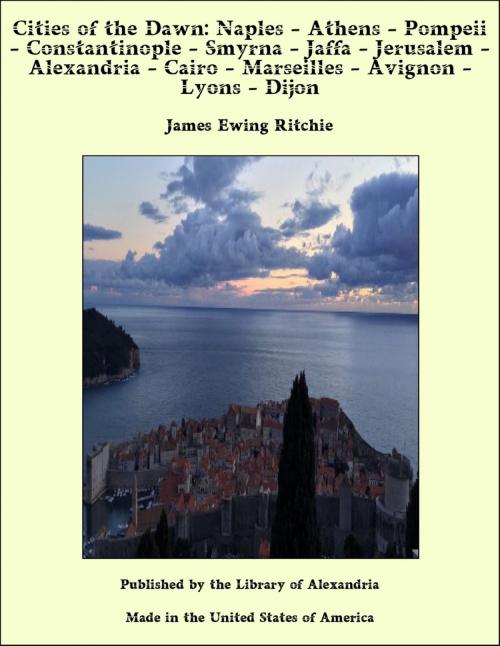Cities of the Dawn: Naples - Athens - Pompeii - Constantinople - Smyrna - Jaffa - Jerusalem - Alexandria - Cairo - Marseilles - Avignon - Lyons - Dijon
Nonfiction, Religion & Spirituality, New Age, History, Fiction & Literature| Author: | James Ewing Ritchie | ISBN: | 9781465623157 |
| Publisher: | Library of Alexandria | Publication: | March 8, 2015 |
| Imprint: | Language: | English |
| Author: | James Ewing Ritchie |
| ISBN: | 9781465623157 |
| Publisher: | Library of Alexandria |
| Publication: | March 8, 2015 |
| Imprint: | |
| Language: | English |
To leave London one day and to arrive in Marseilles the next would have been deemed impossible—the dream of a madman—in the age in which I was born, when steamships and railways were unknown. Yet it is a fact, to the truth of which I can testify. Half a century has elapsed since the fair fields, leafy woodlands, and breezy chalk downs of Kent were invaded by a band of navvies, who, under the skilful direction of the late Sir William Cubitt, built up the main line of the South-Eastern Railway. The next thing was to connect France and Europe, which was done by means of steamers running between Calais and Dover, and thence by rail to all the chief Continental cities and health resorts. I leave London by the Continental express at eight in the morning one cold day in October; in eight hours I am in Paris, passing Calais and Abbeville, both of which places, especially the former, are, I believe, pretty well known in these days of universal restlessness and travel. It is little we see of Paris, the gay and beautiful. We have to dine—for man must dine, if possible, once a day—and to Paris we turn for its cooks and cookery. It is there that the art of dining is carried to perfection. ‘Unquiet meals make ill digestions.’ There is no fear of that as I sit down to my well-prepared repast at the handsome buffet attached to the French Northern Railway, and yet there my troubles begin. As a barbarous Englander, I ask why in Paris, the centre, as it deems itself, of civilization and refinement, I am compelled to help myself to salt by putting my knife into the saltcellar. Then, again, it seems curious to me, and what I am not accustomed to, to eat my fish without a fitting knife and fork. Surely one may expect to find in Paris the refinement one is accustomed to in one’s native land! As to being cheated with one’s eyes open, one does not complain—you expect it, and it is not worth while losing your temper merely for the sake of a few paltry centimes; and yet I felt that I had been done unfairly when, on asking a waiter for a cup of coffee noir, and giving him an English shilling, and particularly calling his attention to the value of the coin, he coolly treats it as a franc, and gives me change accordingly. That was rather a dear cup of coffee, I calculate; but, then, the fault was mine, and mine alone. I ought to have provided myself with French money before I started. I am going on what Dr. Lunn calls an educational tour on the Continent. It seems to me I shall get a good deal of education of some kind or other before I return to my native land again. There are about 112 on board from London and the provinces. As we are bound for Jerusalem, we have, as was to be expected, a large proportion of the clerical element. Ladies are not so numerous as one would expect from what one knows of the curiosity and fondness for adventure of lovely woman. The worst part of the trip is the long, wearying ride from Paris to Marseilles, where we found peace and plenty on board the Midnight Sun. We saw but little of the country on leaving Paris; but when we reached Lyons, where we were refreshed with delicious coffee and bread-and-butter, and were provided with a handsome lunch, to be eaten in the course of our journey, consisting of a bottle of claret, beef and fowl, bread-and-butter, and cheese and fruit—a handsome meal, to which we all did justice—the day broke on us clear and fine.
To leave London one day and to arrive in Marseilles the next would have been deemed impossible—the dream of a madman—in the age in which I was born, when steamships and railways were unknown. Yet it is a fact, to the truth of which I can testify. Half a century has elapsed since the fair fields, leafy woodlands, and breezy chalk downs of Kent were invaded by a band of navvies, who, under the skilful direction of the late Sir William Cubitt, built up the main line of the South-Eastern Railway. The next thing was to connect France and Europe, which was done by means of steamers running between Calais and Dover, and thence by rail to all the chief Continental cities and health resorts. I leave London by the Continental express at eight in the morning one cold day in October; in eight hours I am in Paris, passing Calais and Abbeville, both of which places, especially the former, are, I believe, pretty well known in these days of universal restlessness and travel. It is little we see of Paris, the gay and beautiful. We have to dine—for man must dine, if possible, once a day—and to Paris we turn for its cooks and cookery. It is there that the art of dining is carried to perfection. ‘Unquiet meals make ill digestions.’ There is no fear of that as I sit down to my well-prepared repast at the handsome buffet attached to the French Northern Railway, and yet there my troubles begin. As a barbarous Englander, I ask why in Paris, the centre, as it deems itself, of civilization and refinement, I am compelled to help myself to salt by putting my knife into the saltcellar. Then, again, it seems curious to me, and what I am not accustomed to, to eat my fish without a fitting knife and fork. Surely one may expect to find in Paris the refinement one is accustomed to in one’s native land! As to being cheated with one’s eyes open, one does not complain—you expect it, and it is not worth while losing your temper merely for the sake of a few paltry centimes; and yet I felt that I had been done unfairly when, on asking a waiter for a cup of coffee noir, and giving him an English shilling, and particularly calling his attention to the value of the coin, he coolly treats it as a franc, and gives me change accordingly. That was rather a dear cup of coffee, I calculate; but, then, the fault was mine, and mine alone. I ought to have provided myself with French money before I started. I am going on what Dr. Lunn calls an educational tour on the Continent. It seems to me I shall get a good deal of education of some kind or other before I return to my native land again. There are about 112 on board from London and the provinces. As we are bound for Jerusalem, we have, as was to be expected, a large proportion of the clerical element. Ladies are not so numerous as one would expect from what one knows of the curiosity and fondness for adventure of lovely woman. The worst part of the trip is the long, wearying ride from Paris to Marseilles, where we found peace and plenty on board the Midnight Sun. We saw but little of the country on leaving Paris; but when we reached Lyons, where we were refreshed with delicious coffee and bread-and-butter, and were provided with a handsome lunch, to be eaten in the course of our journey, consisting of a bottle of claret, beef and fowl, bread-and-butter, and cheese and fruit—a handsome meal, to which we all did justice—the day broke on us clear and fine.















